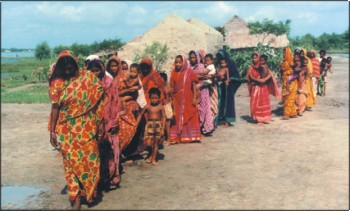The
'place' of a woman
Srabonti
Ali
.........................................................
I
have been told over and over again
by people of all different backgrounds
and classes -- sometimes more eloquently
and euphemistically than others --
that women should know their place.
What that exact place is varies from
person to person. Some people are
more liberal than others in their
views, but at the end of the day,
everyone will agree that there is
a certain "place" in society
for women, and they should confine
themselves within its perimeter.
 Whether
or not a woman who walks out of her
house by herself is stepping out of
that boundary is a mystery. It is
common knowledge, however, that she
will inevitably be subjected to some
kind of harassment, whether it is
someone staring at her inappropriately,
or making unnecessary comments, or
something even worse.
Whether
or not a woman who walks out of her
house by herself is stepping out of
that boundary is a mystery. It is
common knowledge, however, that she
will inevitably be subjected to some
kind of harassment, whether it is
someone staring at her inappropriately,
or making unnecessary comments, or
something even worse.
Acid
throwing, rape, domestic abuse and
general violence against women are
rampant in our society -- and what
makes it scarier is that, so many
of the culprits get away with committing
these crimes.
If
they are not threatened or abused,
they are ignored. Men look through
them, turn a deaf ear to whatever
is being said and generally pretend
they don't exist. Either way, it is
a general source of frustration for
women. If they aren't being ignored,
they are being harassed, and vice
versa.
The
problem lies in the fact that men
are just not exposed to women being
"out in the public sphere."
Anything that deviates from societal
norms poses a threat to people. Of
course it is also a universal phenomenon
that a man will admire film actresses,
scantily dressed and dancing provocatively
in the rain, while at the same time
look down on the average girl-next-door,
obviously "tainted," because
she wants to be able to compete in
the work force with a man, or even
walk down the street without a chaperon
or guardian.
It
is hard to say how to overcome these
double standards and suffocating norms.
One can say education, through rallies,
conferences, speeches, etc, but at
the end of the day, that kind of education
only targets a certain group of men.
To change the way a society thinks
is no easy feat. It takes decades
to change a certain peoples' mentality.
Maybe it will never change, but the
best way to try is to continue to
expose the society to that different
"breed" of women. Bangladesh
is moving along slowly, and not doing
too badly, at that. But it will never
progress unless we provide equal rights
for women, not just on a legal basis,
but also in the social spectrum.
The
female gender is one that presents
itself as an enigma for most people.
What are we, at the end of the day?
It would be simplifying matters too
much to claim that generally in traditional
Bangali society, women are seen as
caretakers, wives, homemakers and
mothers. At the same time, it would
be farcical to state that women in
Bangladesh are living in a gender-equal
environment -- that they have complete
control over their lives, both personally
as well as in the work force. The
fact is that there is no set definition
to the role of the typical Bangali
woman, except that like countless
women around the globe, she is trying
to make a place for herself in the
world, in whichever way she can.
.........................................................
The
author is staff writer of Star Weekend
Magazine.

